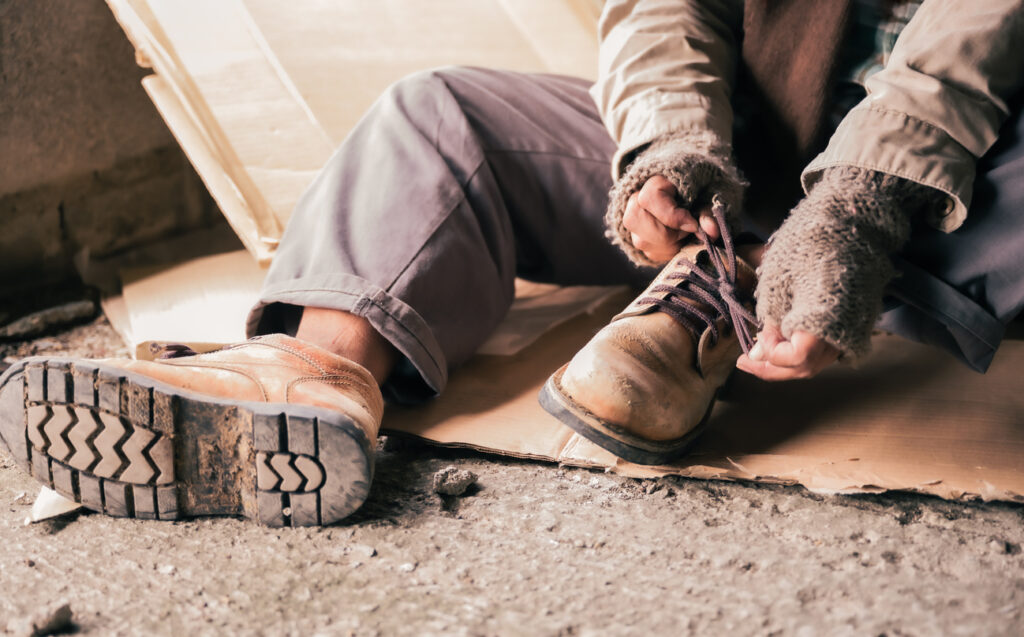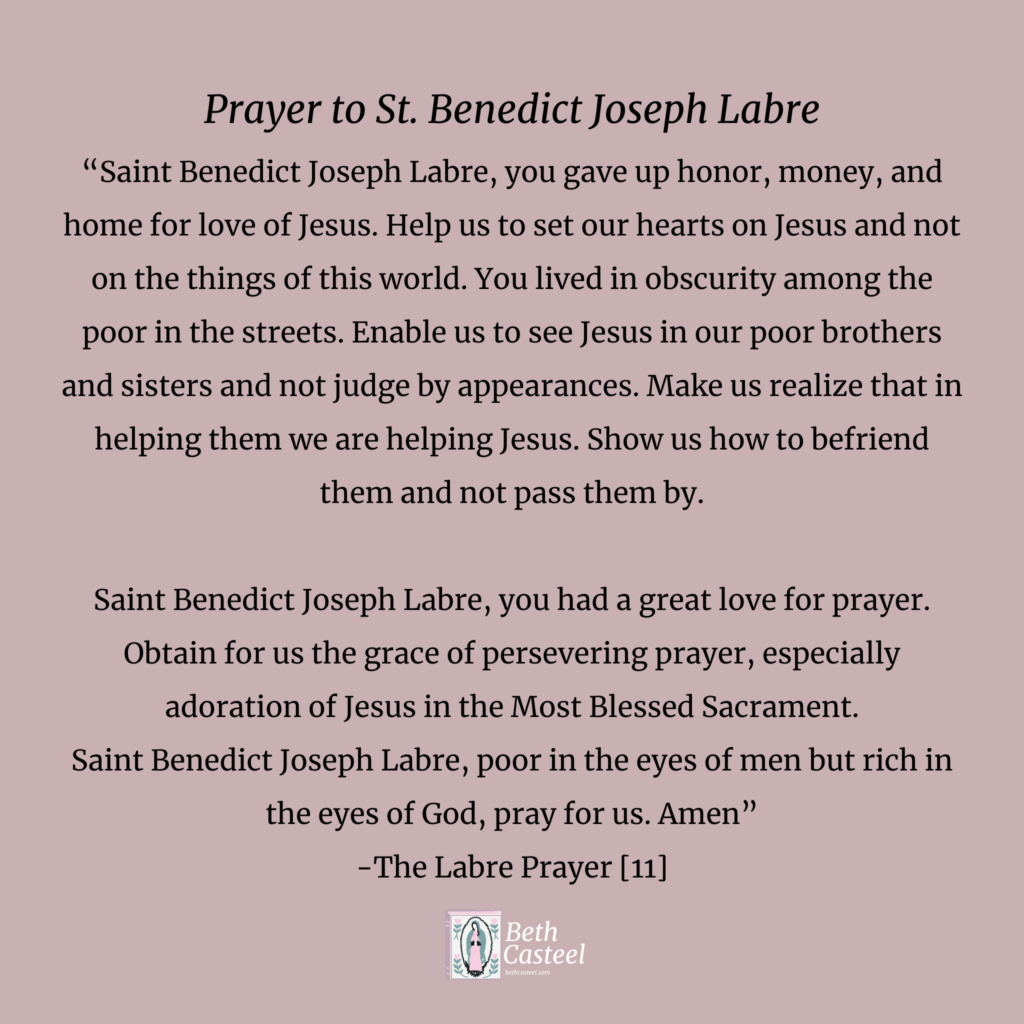The Hunger of a Homeless Soul

He sat on a piece of cardboard and meager belongings. I almost stepped on him as I hurried down the street looking for a meatless lunch. It was Ash Wednesday; the evening prior had been our date night in the city. While my husband took a work call in the car, I walked around the Strip District in Pittsburgh looking for something for us to eat. As I walked past a nice chocolate shop, my eyes locked with the homeless man on the corner. I had met him there before. “Can you spare something?” Warm brown bloodshot eyes halted my steps.
The older man spoke with gentle mannerisms. He wore a black hoodie and sweatpants. He seemed rooted to the ground despite the throngs of people that passed him on their way to sidewalk T-shirt deals and the walk-in counters where frothy Italian cappuccinos and thick slices of doughy pizza are sold.
This ethnic food-lovers corner of The Burgh is a narrow strip of land bounded by the Allegheny River and the Hill District that was established in 1814 by property owners James O’Hara and George A. Bayard. The Strip’s accessibility to the river and the railways made it ideal for development and lured Andrew Carnegie’s iron and steel production, ALCOA company’s production of aluminum, and George Westinghouse’s air brake factory. In the late 19th Century, wholesale merchants began taking advantage of the rail and waterway proximity. Though business in the Strip declined during the wars and the Depression, in the 1990s, many restaurants and ethnic food providers reopened. [1] Today the Strip attracts people looking for everything from bargain clothing to pierogies, sidewalk tacos, or, like me, the well-stocked cheese counter and shelves of good pastas and olive oils at the Pennsylvania Macaroni Company.
He sat in this food mecca begging.
I hated that my urgency to fill my own stomach made me annoyed at the request. I smiled slightly and looked through my wallet. I could afford to give him everything in it. I didn’t. I handed him a $10. He smiled, thanked me, held my hand for a minute. “How are you today?” he asked. I pulled my hand away. “I have a cold,” I said. “Awe. I am so sorry to hear you are sick,” he replied. “I hope you feel better real soon and God bless you.”
I thanked him and moved on, past the stores selling locally distilled whiskey and dried flowers, past the all-day breakfast cafes and seafood restaurants. I found a little coffee shop that had smoothies, grilled cheeses, and hummus wraps.
It cost more than $10.
While mental health problems often go hand in hand with homelessness, the primary reason people are sleeping on the streets is a “profound lack of affordable housing.” About 25 percent of homeless persons are believed to have a severe mental illness, but being on the streets makes depression and suicidal tendencies much more likely.[2] In other words, once you are sitting on the street with nothing, it is nearly impossible to climb out.
Jesus said, “feed the hungry” and “shelter the homeless.” Give it all. Don’t question or overthink it. Feed them. Clothe them. Shelter them. Maybe even live amongst them.
The patron saint of homeless persons, Saint Benedict Joseph Labre, gave up a comfortable family life to live alongside the poor. Born in France in 1748, the oldest of 15 children, he studied under his uncle to be a priest, but poor health and inadequate academic success kept him from religious life. He dressed in ragged clothes, slept in the streets, ate discarded food or what he begged, and yet shared what he had with other poor. It is said that a rosary dangled from his fingers, and he acted as a pilgrim, traveling from one shrine or church to another, until finally, on April 16, 1783, increasingly sick and worn from his travels, he prayed for two hours before a church in Rome and then died in a nearby house.[3] Like St. Francis of Assisi, St. Labre gave up material comforts to live with the poor.
Saint Mother Teresa of Calcutta implored us to see Jesus in the eyes of the poorest of the poor and she too chose to live meagerly to better understand their struggle. Maybe the eyes that peer up at me from the streets belong to a modern-day St. Labre. We judge them as we pass – day after day – just as the people of Jerusalem did when they did not stoop to help the man who had been sick for 38 years and lay in the Pool of Bethesda, near the Sheep Gate.[4]
A woman often sits on the street leading to Pittsburgh’s hockey arena. She has taken up her doorstep near a parking garage for more than a decade. I remember my dad bending to hand her a few bills as we hurried to the arena in the bitter cold. It has been years since my father could attend a game, but I still look for his friend and she is always there. I hand her some cash, she clasps my hand, smiles with a mouthful of broken and blackened teeth. Does she have a place to go during the day? Will she sleep on the streets after the crowds are gone or does the shelter still take her? What is her name? Who was she before she was this? Like St. Francis or St. Labre, did she choose to live this way?
I am ashamed that I don’t know the answers – that I barely stooped to hand her the money and say hello as we hurried on our way to our car and drove to our warm house.
I’m embarrassed that I stared at another man as we drove through the city. He stood and stretched, picked up a dirty blanket from the ground and shook it. A backpack weighed his slim frame, so he tilted forward; another bag sat by his feet; a dirty blue water bottle nestled in the mud and rock of the hillside under the steel bridge where we waited for the light to turn green. Tired looking people milled around the social service and bond agencies near the county jail. The man’s silver hair and beard distinguished him from the other street people.
A 2024 report on the State of Homelessness found that 12,556 people “experienced homelessness on a given night in 2023” (that is 10 out of every 10,000 people in the general population). On a single night in January 2024, at least 771,480 people were homeless with “homeless” being defined as sleeping outside, in a car or abandoned building or other unfit shelter, or in an emergency or transitional housing shelter.[5]
Most cities cannot escape scattered tents, sidewalk sleepers, and bulging bundles under the bridges. I remember a morning walk down Grafton Street in Dublin, Ireland, in the summer of 2022. As I walked the pedestrian street of high-end shops, passing sleek well-dressed women with their Beneton bags and designer sunglasses, I saw a little sign for St. Teresa’s Catholic Church. I turned into the alley and practically tripped over a handsome young man with well-trimmed hair who sat outside the doors of the Catholic church. His head tilted, he banged a tin cup of coins against his khaki-clad knee, challenging church goers to prove their Christianity. I had only a $50. I walked by. How does one decide the worth of a life?
I remember the homeless men and women who took up city benches in Asheville, North Carolina. I remember my shock – my stereotypical assumption that this artsy liberal town wouldn’t tolerate the lack of appropriate housing. I remember them from other cities – from the subways, the underground passageways, the bus shelters, and alongside riverside trails, and loitering in the library.
A particular scene remains in my memory from a winter morning writing session at our community library. I sat in the adult section where the décor remains the same as it was when I was a kid in the 1970s – square brown laminate tables with orange, green and blue thinly padded chairs, study carols that dot the edges of the room.
The sound of silence was shattered by a tall young man who was “working the room.” Wearing jeans, a winter coat, hat, and pristine white athletic shoes, he yelled: “Yo. What up? I’m tryin’ to go to the DMV today brother.”
He greeted a large middle-aged man who was carrying a heavy load. “I’m done walking for today,” the scraggly-bearded newcomer quietly said. “Been to St. Vincent de Paul and the shelter. I need to sit for a while.” They talked about how good the lunch was at Salvation Army.
He sat at the table next to me with a jug of Schwebel’s Iced Tea, a large bag of Rold Gold pretzels and a small bag of Cheetos crunchy cheese curls. He chugged the iced tea, gulping noises escaping with coughs. He plunged his hands into the snack bags, then smacked them together to knock the crumbs off after every bite. Directly across from him a sign proclaimed: “You may not eat or drink in here.”
He unloaded a stack of books, a smaller gym bag, a bundle of note cards and a bottle of pills from a large rolling backpack. He continuously opened and closed the Velcro on his gloves that lay on the table in front of him. He scratched off lottery tickets with a penny. His cough was pervasive.
A man came in from the cold, walking slowly and pulling a black rolling suitcase. His face was stubbled with hair, a black cap pulled over his ears. He pulled a chair away from my table and sat near the window, two feet from me, coughing and breathing like a smoker. He mumbled quietly to himself while staring at his cell phone (plugged into the wall). After a while, he got up and shared a toiletry kit with the tall young man.
An older man with a well-kept gray beard and glasses sat at a table alone, never taking off his gloves or parka. The noises the other men were making caused him to turn but he didn’t talk to anyone. He had no bag. He sat at a table for an hour, the oversized hood of his parka pulled around his face.
The noisy young man left. The snoring of another homeless person pierced the sudden quiet. He sat with his head on a table, his arms outstretched, his meager belongings scattered about him. The snoring comforted me in the way that a noise cancelling machine does.
After two hours, the men filtered out. The library had been a haven.
I brought my four children to this library when they were small. The bathrooms were always locked. While my kid stood there, legs crossed screaming, “I have to go now,” I would be waiting for the librarian to find the key. “We can’t leave the doors open because we’ve had trouble with homeless people making a mess in there and using drugs,” the librarian told me. There is a dichotomy that exists in a place where well-dressed, middle-class patrons are checking out bestselling books about poverty like Hillbilly Elegy, The Glass Castle, Educated, Evicted and Tell Them Who I Am, and shabbily clad, poorly groomed homeless men are trying to stay warm.
So often we hear people say, “why should I give money to the homeless if that person is just going to spend the money on drugs or alcohol”? Pope Francis, when posed with this question, responded, “If a glass of wine is the only happiness he has in life, that’s okay. Instead, ask yourself what do you do on the sly, what happiness do you seek in secret.” Pope Francis has repeatedly been in the news for his deference to the homeless. In November 2023, he dined with approximately 1,200 poor, refugees, and homeless from around Rome. [6] In 2016, the Pope had a celebration for the homeless to close the Holy Year of Mercy. At least 6,000 pilgrims (who were homeless or socially excluded) from 22 different European countries were provided the means to attend. “I ask your forgiveness for all the times that we Christians stand before a poor person or a situation of poverty and look the other way,” the pope said. “The forgiveness of those who have felt unloved and unwanted by men and women of the church “purifies us and helps us to believe once again that at the heart of the Gospel is the great message of poverty and that we – Catholics, Christians, all of us – must form a church that is poor for the poor.”[7]
Servant of God Dorothy Day (1897-1980), an American journalist and activist who converted to Catholicism in 1927 and, with her husband, Peter Maurin, founded the radical Catholic Worker’s movement, said it more bluntly,
“Those who cannot see Christ in the poor are atheists indeed.”
Her life was complicated, but her message was simple: we are called to love one another and especially the poor through the works of mercy.[8] Day founded “houses of hospitality,” in which voluntary poverty was encouraged for the workers. The shelters around the world continue to provide food, clothing, and shelter to those in need. Day’s cause for sainthood was officially opened in 2000 and Pope Francis has repeatedly hailed her work with the poor. In his address to Congress in 2015, the Pope included her as one of four great Americans. In 2024, Orbis Books released an updated edition of her memoir, From Union Square to Rome, with a forward by Pope Francis.
“She herself reminds the reader how the struggle for justice is one of the ways whereby, even unconsciously, everyone can fulfill God’s desire for a reconciled humanity, and in which the sweet scent of love drives out the nauseating stink of selfishness,” wrote the Pope, whose own radical service to the poor of Rome has included installing two laundromats and creating a “palace for the poor” at the Vatican.[9]
Handing out a few dollars to the lady by the hockey arena doesn’t “drive out my nauseating stink of selfishness.”
Seeing Christ in the homeless must be a constant hunger within my own soul which seeks to satisfy the scorch of suffering. It must be my own recognition that I will remain homeless until I reach heaven.
“Thus says the Lord: Share your bread with the hungry, shelter the oppressed and the homeless; clothe the naked when you see them, and do not turn your back on your own. Then your light shall break forth like the dawn, and your wound shall quickly be healed; your vindication shall go before you, and the glory of the Lord shall be your rear guard.”[10]

[1] stripdistrictneighbors.org
[2] National Library of Medicine, National Center for Biotechnology Information
https://pmc.ncbi.nlm.nih.gov/articles/PMC7525583
[3] Guild of St. Benedict Joseph Labre, guildbjlabre.org
[4]John Chapter 5: 1-18, bible.usccb.org
[5] National Alliance to End Homelessness, https://endhomelessness.org/homelessness-in-america/homelessness-statistics/faqs/
[6] https://www.catholicnewsagency.com/news/256057/photos-pope-francis-shares-vatican-lunch-with-poor
[7] https://www.catholicherald.com/article/global/pope-francis/forgive-us-for-looking-the-other-way-pope-tells-homeless-people/
[8] https://catholicworker.org/dorothy-day-a-saint-for-our-age/
[9] https://www.americamagazine.org/faith/2023/08/22/dorothy-day-pope-francis-245907
[10] https://bible.usccb.org/bible/readings/020914.cfm#:~:text=Reading%201,or:
[11] jcu.edu (John Carroll University Saint Benedict Joseph Labre Project

0 Comments